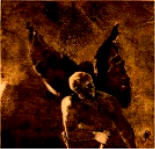
The Gospel of the Hour
|
Biography of the Author Paul Berthelot, also known under the pseudonym Marcelo Verema among the Esperantists and Anarchists, appeared to us in Rio de Janeiro four years ago, coming from Montevideo, the verda stela on his hat. His simplicity, sobriety, sometimes brutal frankness, intelligence, wide learning, especially in chemistry, botany and physiology, his knowledge of anarchy and his conversational charm soon earned him the esteem of his comrades and the admiration of many others. He rarely spoke about himself. I think he was born in Paris; at least he was studying medicine there when he had to leave France to avoid the barracks, not having the physical strength to support a fight that he did, however, believe useful. He then traveled a great deal. Orphaned a long time before, his legal guardian had mismanaged his inheritance and he gave up the rest of it to an elderly aunt. To live in a foreign country he became a printer. In Rio he got a position as a French and Esperanto professor at the Berlitz Academy, then director of the Petropolis branch, a summer residence of aristocrats and diplomats. He had to leave this place because of antimilitary propaganda. After a period of destitution he was going to be able to return to Europe when a woman, a teacher for the Indians, spoke to him about the customs, qualities and gentleness of her savage students, as well as of the fertility of the land they lived on. And so in agreement with a group of friends he decided to go study the primitives and their lands. Moreover, wouldn’t it be possible to take advantage of their communist tendencies to win their support and establish in their regions a free colony that would be able to remain open to those persecuted by oppressive regimes? First he went to Leopoldina in the State of Goiás on the Araguaia River, a fifteen-day journey from Sãu Paulo. A comrade who went with him left him a few months afterwards. Later, after he had studied the Indians and learned their language, while collaborating with friendly newspapers in Sãu Paulo and writing The Gospel of the Hour, he continued his voyage to the North, wanting to reach Belém do Pará. He died at Conceição do Araguia in August of 1910, at the age of 30. The report he had written to me was finished, but unfortunately it never arrived. Kropotkin wrote, with regard to Élisée Reclus: ‘Anarchy has, at least, produced a number of characters of exquisite beauty.’ Berthelot was one of them. Like Reclus he was an anarchist to the very core of his being; like him he had none of that hypocrisy of the despot or ambitious. Death made a clean and final break with the hope that he represented for us. Neno Vasco, ‘Temps Nouveaux’ No. 54, Paris, 1912. |
